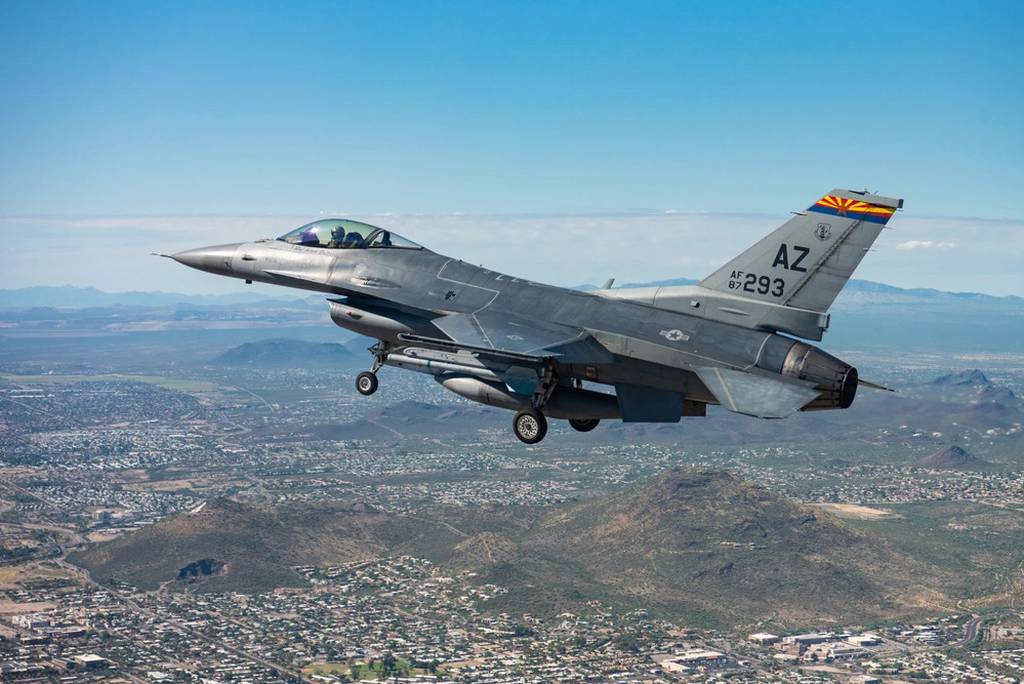
Ukrainian military pilots have begun learning to fly the F-16 Fighting Falcon jet in Arizona, the U.S. Air Force confirmed Wednesday.
A “small number” of Ukrainians started training at Morris Air National Guard Base in Tucson this week, Air Force spokesperson Rose Riley said in an emailed statement. Morris is home to the 162nd Wing of the Arizona National Guard, an F-16 pilot training hub that hosts international students.
“The training curriculum will align with the foundational knowledge and skills of each pilot and is expected to last several months,” Riley said.
The initiative is the latest step in America’s efforts, along with its NATO allies, to support Ukraine in its nearly two-year war with Russia. The U.S. has provided more than $113 billion in military, humanitarian and other aid to Ukraine since Russia invaded its eastern European neighbor in February 2022.
The New York Times reported in August that the war had killed nearly 500,000 troops in its first 18 months, citing U.S. officials. Thousands more civilians are dead and millions displaced.
U.S. officials have stressed that building a Ukrainian F-16 enterprise is a long-term solution to modernize the country’s military and bolster regional security, not an immediate way to add combat firepower as Ukraine tries to drive out Russian forces.
In September, Air National Guard boss Lt. Gen. Michael Loh told reporters the first group of Ukrainian pilots could finish F-16 training by the end of the year, though it would take longer to get the jets into combat.
The initial pilots were expected to come in with more flight experience than others who may follow them, which would require the U.S. to spend more time getting them up to speed. Air Force leaders have estimated that training each batch of pilots could take up to nine months on average.
Ukraine’s leaders have pushed their Western allies to provide fighter jets. The Biden administration demurred for months, citing concerns about the cost, the possibility of provoking Russia and the planes’ survivability against Russian air defenses.
But an Air Force-run study showed the idea was possible, and earlier this year, the administration signed onto a plan to send Ukraine the airframes — provided by the Netherlands and Denmark — and to train troops in Europe and the U.S. with a coalition of nearly a dozen countries.
Before arriving in Arizona, the first pilots headed to an English-language training program at Joint Base San Antonio-Lackland, Texas.
The Defense Language Institute’s English Language Center, led by the Air Force, graduates around 350 foreigners from about 50 countries each year. The program prepares airmen to hold conversations with pilots in flight, crew members in the back of an aircraft, and air traffic control towers, while minimizing accents and familiarizing students with Western aviation norms.
Learning to operate the F-16 will put existing combat skills and the English-language program to the test. Politico reported Oct. 13 that Ukrainian pilots had already begun learning their way around the jet in flight simulators in Europe.
Some U.S. officials have publicly doubted how much of a difference giving Ukraine more advanced fighter jets than those in its Soviet-era fleet will make.
F-16s “will give the Ukrainians an increment of capability that they don’t have right now,” Air Force Secretary Frank Kendall said in May. “But it’s not going to be a dramatic game-changer, as far as I’m concerned, for their total military capabilities.”
Not all agree with that assessment.
Loh told reporters the F-16′s ability to disable enemy air defenses and fly low-altitude strike missions could help Ukraine. The jet is also supported by a robust network of international users and is still in production at Lockheed Martin.
“I definitely think it can be a game changer,” Loh said.
Rachel Cohen joined Air Force Times in March 2021. She served as senior reporter until October 2023. Her work has appeared in Air Force Magazine, Inside Defense, Inside Health Policy, the Frederick News-Post (Md.), the Washington Post, and others.

